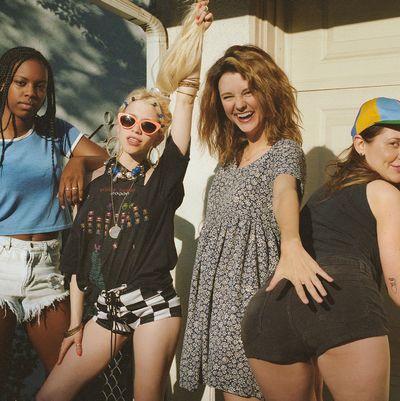
Being a woman in the film business still sucks. Only four women have ever received an Oscar nomination for best director, which is less than the number of superhero movies coming out in 2016. But as studios continue to pack their slates with male-directed franchises, this year’s Tribeca Film Festival offers tangible proof that it’s not lack of talent or ambition that is keeping women shut out of Hollywood’s studio system. This year’s festival boasts 38 female-directed features — around 40 percent of the total features — and 19 female-directed shorts, which is a record for a festival that has celebrated women since its inception.
On Friday afternoon, some of these women gathered at Tribeca’s Odeon restaurant for the festival’s annual women filmmaker’s luncheon, hosted by Chanel and Tribeca CEO and co-founder Jane Rosenthal. “This is our community, it’s a community of extraordinary women,” Rosenthal told a crowd that included both up-and-coming directors and familiar faces like Katie Holmes, Jennifer Westfeldt, and Judy Greer. “And you should know who your sister is next to you.”
After the event, I spoke to Genna Terranova, Tribeca’s Festival Director. Terranova credited Rosenthal for helping other women get a foothold in the industry, noting that around 80 percent of Tribeca’s full-time staff are female. “When it comes to trying to elevate those voices, it’s a little bit easier for us because we have that self-awareness.”
While Tribeca has no quota system when it comes to picking films for the festival, a number of year-round initiatives are in place to help nurture and discover female talent. Tribeca All Access, launched over ten years ago, helps filmmakers from underrepresented communities get their projects made, while the Through Her Lens initiative (in partnership with Chanel) helps give financial support and mentorship to emerging female directors developing short films.
The proof is in the lineup. On Saturday, I saw Women Who Kill, a wicked little horror-comedy about podcasting, female serial killers, and Park Slope food co-ops, directed by Ingrid Jungermann. Then I hopped over to a screening of All This Panic, an evocative documentary about teen girls in Brooklyn directed by husband and wife duo Jenny Gage and Tom Betterton. Also on my lineup this week: Sara Taksler’s Tickling Giants, a documentary about “Egypt’s Jon Stewart,” Bassem Youssef; All We Had, Katie Holmes’s directorial debut about a mother and daughter hit by the financial crisis; and “she-wolf of Wall Street” drama Equity, the second film by Meera Menon, who won Tribeca’s inaugural Nora Ephron Prize back in 2013. While not all these films focus on female stories (nor should they), they bolster the argument that more women behind the cameras means more onscreen visibility for women, too.
“What we’re working to change is how we get new women into that mix, to bring in new voices,” says Terranova. “So a woman makes her first feature and then she’s actually able to make a studio film. That’s something we don’t see often for female filmmakers, though it happens often for their [male] counterparts.”
While male filmmakers are often given the chance to helm major studio tent-poles after proving themselves with a handful of indies (like Jurassic World’s Colin Trevorrow), studio execs remain reluctant to hire female directors. A recent study by the Sundance Institute and Women in Film found that there is still a ton of bias when it comes to women helming studio films: From 2002 to 2014, there was a 23:1 ratio of male to female directors among the top-grossing 1,300 films. This disparity doesn’t come from a lack of talented women making independent films, but from denying them the resources needed to segue into the studio system.
Terranova hopes that Tribeca’s work — plus the increased opportunities for women on TV and digital platforms — will eventually help move the needle. “We are kind of on the front lines, of seeing who the next voices are and giving them their entrance into the consciousness of those who are finding talent,” she said.
At the Chanel luncheon, I chatted with the trio behind Girl Band, a short film about a female rock group that they are hoping to spin into a TV show. Kerry Furrh, Cailin Lowry, and Olivia Mitchell are friends who met at USC. Now in their mid-20s, they co-directed, co-wrote, edited, and scored the film together, hoping to develop the kind of female-focused coming-of-age-story that they would have wanted to see when they were teenagers.
All three say Tribeca left them feeling more confident about their place as young women in the industry. “The conversation about women in film is a lot louder than even when we were in college,” said Lowry. “So I’m optimistic, because I think the conversation is actually happening now, when before it was just being whispered in spaces with women.”

